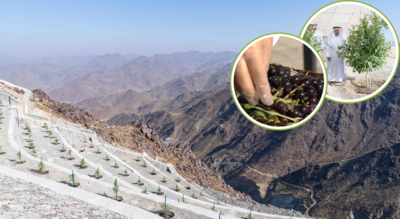ARTICLE AD BOX

First grapes harvested 'above the clouds’ in Sharjah under new project/ Image: X
Far from the rolling vineyards of Tuscany or the sun-drenched slopes of southern France, grapevines are now thriving at 850 metres above sea level on the rocky, windswept slopes of Jebel Deem in Sharjah’s eastern mountains.
In a landscape more known for its harsh terrain than fertile soil, the crescent-shaped Ghamam retreat has defied expectations, transforming rugged rock into a thriving vineyard, and this landmark moment unfolded at Ghamam, a new high-altitude development on Jebel Deem, where the UAE’s first mountain grape cultivation has just borne fruit.
Turning rock into vine: The Ghamam project
Named after the Arabic word for “ above the clouds,” the Ghamam project is part of a sweeping vision led by Sheikh Dr Sultan Al Qasimi, Ruler of Sharjah.
More than 4,500 trees, including grape vines, olives, apples, and pomegranates — have been planted on the slopes of Jebel Deem as part of the emirate’s ambitious strategy to green the mountains and cultivate food in unlikely places. Photos and videos shared by Sharjah News this week captured the harvest, a moment that is both a technical milestone and a symbol of what sustainable mountain agriculture could look like in the UAE.
“Its unique location provides visitors with a panoramic view of the city’s coastline and surrounding mountain valleys, offering a captivating experience and holding significant cultural and social importance,” according to documentation from the Sharjah Ruler’s office.
From farm to retreat: A vision above the clouds
The agricultural breakthrough is only one part of the Ghamam retreat, a crescent-shaped mountaintop destination combining farming, tourism, and leisure.
The site spans 4,700 square metres and features two floors that blend mountain hospitality with immersive visitor experiences.
- The first floor houses a restaurant, open-air café, and reading area serving fresh mountain-grown produce.
- The ground floor includes viewing platforms, a multipurpose hall, prayer rooms, and playgrounds, all designed to let guests connect directly with the landscape and the land that sustains it.
The development serves dual purposes: showcasing high-altitude farming in action and offering a space for cultural, social, and educational engagement.
Kalba’s ongoing transformation
Located within the Kalba region, the project adds a new layer to Sharjah’s growing reputation as a destination for innovative development.
Kalba has already launched major attractions such as the Hanging Gardens, Al Hefaiyah Lake, and a landmark clock tower, positioning the city as a leading eco- and agri-tourism hub. The Ghamam harvest complements this evolution by offering a mountain-to-table experience for visitors, blending scenic tourism with food sustainability. The initiative also supports Sharjah’s broader environmental and economic goals.
By integrating agriculture with tourism, the project creates multiple revenue streams while promoting agricultural education and sustainable practices.
Engineering the impossible
Supporting this remote operation is a robust infrastructure network, including 10 kilometres of newly built roads and two bridges. One connects Wadi Al Helo Tunnel to the new Sharjah-Kalba Road, while another leads directly to the peak. These roads are built to accommodate both heavy agricultural vehicles and tourist buses, ensuring safe and efficient access. Future plans in the area include a FIFA-standard stadium on Mount Daym, located 650 metres above sea level, where temperatures are projected to be 10°C cooler than the city. Alongside it, a 100-room sports tourism hotel will rise, connected to the Ghamam retreat via a dedicated pedestrian path. These additions are part of a long-term integrated mountain development strategy combining sports, hospitality, and sustainability.
Sharjah’s second mountain retreat
The Ghamam project follows the success of Al Suhub Rest Area, Sharjah’s first mountain retreat, built 600 metres above Khor Fakkan and inaugurated in 2021. Together, the two projects underscore Sharjah’s pioneering role in mountain tourism and eco-conscious development. As the UAE works toward the goals of its National Food Security Strategy 2051, initiatives like Ghamam offer a blueprint for turning difficult terrain into productive, economically viable, and environmentally sensitive landscapes.



.png)
.png)
.png)
















 1 day ago
3
1 day ago
3









 English (US) ·
English (US) ·